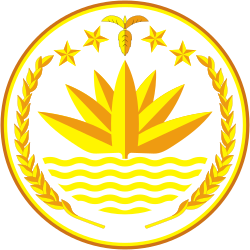Not to be confused with Government Seal of Bangladesh.
| National Emblem of Bangladesh বাংলাদেশের জাতীয় প্রতীক | |
|---|---|
 | |
| Armiger | People's Republic of Bangladesh |
| Adopted | 1971 |
| Shield | The national flower, the water lily resting on water, having on each side an ear of paddy and being surmounted by three connected leaves of jute with two stars on each side of the leaves |
The National Emblem of Bangladesh (বাংলাদেশের জাতীয় প্রতীক) is used by the Government of Bangladesh and its agencies. The emblem appears on official government documents and currency.
The emblem was adopted shortly after independence in 1971. In the centre is a water lily, that is bordered on two sides by rice sheaves. Above the water lily are four stars and three connected jute leaves. The water lily is the country's national flower, and is representative of the many rivers that run through Bangladesh. Rice represents its presence as the staple food of Bangladesh, and for the agriculture of that nation. The four stars symbolise the four founding principles of the Republic that were enshrined in the Constitution of Bangladesh: nationalism, socialism, democracy, secularism.
The details of the emblem are inscribed in the constitution:
প্রজাতন্ত্রের জাতীয় প্রতীক হইতেছে উভয় পার্শ্বে ধান্যশীর্ষবেষ্টিত, পানিতে ভাসমান জাতীয় পুষ্প শাপলা, তাহার শীর্ষদেশে পাটগাছের তিনটি পরস্পর-সংযুক্ত পত্র, তাহার উভয় পার্শ্বে দুইটি করিয়া তারকা৷
— বাংলাদেশের সংবিধানের অনুচ্ছেদ ৪(৩)
The national emblem of the Republic is the national flower Shapla (Nymphaea nouchali) resting on water, having on each side an ear of paddy and being surmounted by three connected leaves of jute with two stars on each side of the leaves.
— Article 4(3), Constitution of Bangladesh
Gallery
-
 Badge of Bengal Presidency during British Rule in India
Badge of Bengal Presidency during British Rule in India
-
 Emblem of East Pakistan
Emblem of East Pakistan
-
 Presidential seal of Bangladesh
Presidential seal of Bangladesh
-
 Seal of the Prime Minister of Bangladesh
Seal of the Prime Minister of Bangladesh
-
 Seal of the Chief Adviser of Bangladesh
Seal of the Chief Adviser of Bangladesh
-
 National Emblem of Bangladesh on coin (50 Poisha, 2001)
National Emblem of Bangladesh on coin (50 Poisha, 2001)
See also
References
- "বাংলাদেশের সংবিধানের অনুচ্ছেদ ৪(৩)". Ministry of Law, Justice and Parliamentary Affairs. 4 November 1972. Archived from the original on 26 February 2023. Retrieved 26 February 2023.
- A Hossain; G Kabir; M M Ud-deen & A M S Alam (2007). "Cytological studies of Nymphaea species available in Bangladesh". Journal of Bio-Science. 15: 7–13. doi:10.3329/jbs.v15i0.2197.
- "The Constitution of the People's Republic of Bangladesh | 4. National anthem, flag and emblem". bdlaws.minlaw.gov.bd. Retrieved 21 February 2021.
| Main symbols |
| |
|---|---|---|
| Monuments and Memorials |
| |
| People |
| |
| Flora and fauna |
| |
| Other symbols |
| |
| Bangladesh articles | |||||||||||||||
|---|---|---|---|---|---|---|---|---|---|---|---|---|---|---|---|
| History |
| ||||||||||||||
| Geography | |||||||||||||||
| Politics |
| ||||||||||||||
| Economy |
| ||||||||||||||
| Society |
| ||||||||||||||
This Bangladesh-related article is a stub. You can help Misplaced Pages by expanding it. |
This heraldry-related article is a stub. You can help Misplaced Pages by expanding it. |

